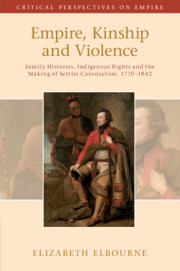 Empire, Kinship and Violence
Empire, Kinship and Violence Book contents
- Empire, Kinship and Violence
- Critical Perspectives on Empire
- Empire, Kinship and Violence
- Copyright page
- Contents
- Figures
- Maps
- Acknowledgements
- A Note on Nomenclature
- Abbreviations
- Introduction
- Part I North America
- Part II Upper Canada, New South Wales, Van Diemen’s Land, Victoria, Western Australia, the Cape Colony, Sierra Leone
- 4 Upper Canada
- 5 New South Wales
- 6 Southern Africa
- 7 From Sierra Leone to Swan River
- Part III Britain, the Cape Colony, West Africa
- Bibliography
- Index
6 - Southern Africa
Protest, Petitions and the Paradoxes of Imperial Liberalism
from Part II - Upper Canada, New South Wales, Van Diemen’s Land, Victoria, Western Australia, the Cape Colony, Sierra Leone
Published online by Cambridge University Press: 15 December 2022
- Empire, Kinship and Violence
- Critical Perspectives on Empire
- Empire, Kinship and Violence
- Copyright page
- Contents
- Figures
- Maps
- Acknowledgements
- A Note on Nomenclature
- Abbreviations
- Introduction
- Part I North America
- Part II Upper Canada, New South Wales, Van Diemen’s Land, Victoria, Western Australia, the Cape Colony, Sierra Leone
- 4 Upper Canada
- 5 New South Wales
- 6 Southern Africa
- 7 From Sierra Leone to Swan River
- Part III Britain, the Cape Colony, West Africa
- Bibliography
- Index
Summary
The former Attorney General of New South Wales, Saxe Bannister, on whom this chapter focuses, travelled to the Cape Colony after being forced from his position in Australia. In the late 1820s, he argued for the need to apply British justice impartially in a frontier context, leaving an important record of colonial violence. He revealed abuses in colonial courts in two cases of settler violence against Khoekhoe people in the eastern Cape, despite putative British legal reform; highlighted Xhosa wrongs in the face of dispossession; and accused the colonial government of countenancing an illegal slave trade in San children. Khoekhoe people tried to use Bannister’s legal expertise to interact with the colonial government through petitions, while Xhosa chiefs funnelled statements of grievance through him, albeit to little immediate effect. I also suggest that Bannister thought of the Khoekhoe as analogous to the Haudenosaunee, in part because of their roles as military allies of the British, and may have shared political strategies with them. Bannister simultaneously believed that he, through his association with the trader Francis Farewell, had inherited a treaty with the Zulu leader Shaka giving the pair territory in Zululand. Despite being disappointed in his effort to monetize this ‘treaty’, Bannister later vigorously promoted the creation of the British colony of Natal. The chapter explores paradoxes of imperial liberalism and its difficult relationship to anti-colonial resistance.
- Type
- Chapter
- Information
- Empire, Kinship and ViolenceFamily Histories, Indigenous Rights and the Making of Settler Colonialism, 1770-1842, pp. 232 - 269Publisher: Cambridge University PressPrint publication year: 2022
